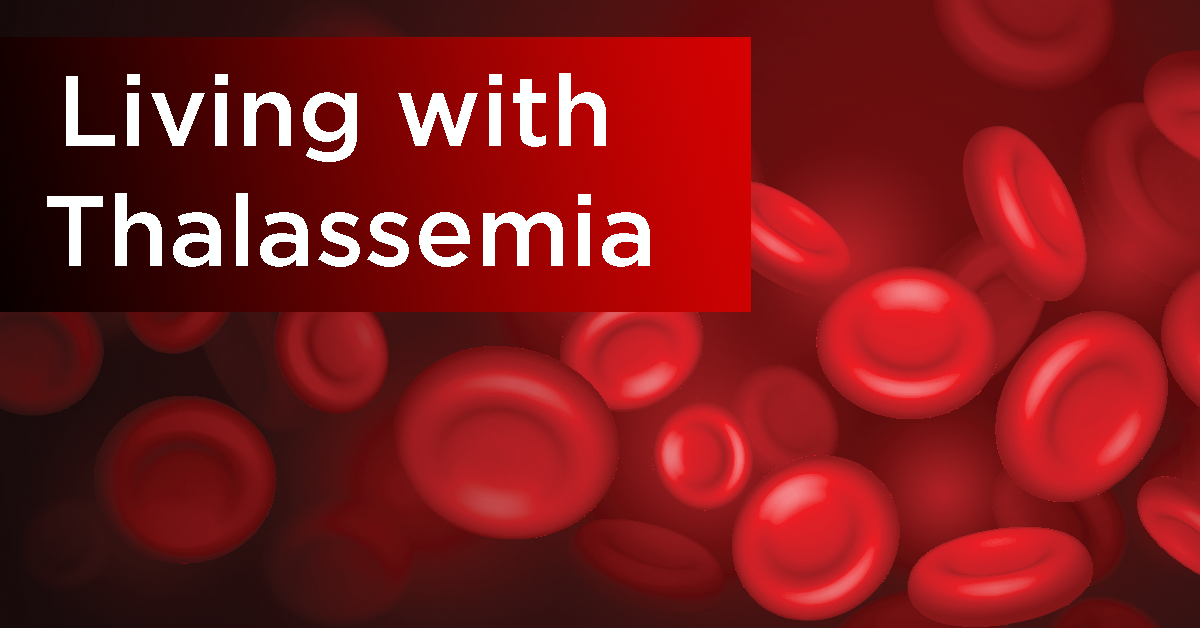Living with Thalassemia

Haemoglobin is an iron-rich protein in red blood cells. It carries oxygen to all parts of the body. As a result of thalassemia, your body makes less hemoglobin than normal. It consists of two different proteins, an alpha, and a beta. If the body doesn’t produce enough of either of these two proteins, the red blood cells do not form properly and cannot carry sufficient oxygen. The result is anemia that begins in early childhood and lasts throughout life.
The two main types of thalassemia are called “alpha” and “beta,” depending on which part of an oxygen-carrying protein in the red blood cells is lacking.
Causes
Both types of thalassemia are inherited in the same manner. The disease is passed to children by parents who carry the mutated thalassemia gene. A child who inherits one mutated gene is a carrier, which is sometimes called the “thalassemia trait.” If someone in your family has or had thalassemia, you can say you have a family history of thalassemia.
Symptoms
Those with thalassemia major usually show symptoms within the first two years of life. They become pale and listless and have poor appetites. They grow slowly and often develop jaundice. Without treatment, the spleen, liver, and heart soon become greatly enlarged. Bones become thin and brittle. Heart failure and infection are the leading causes of death among children with untreated thalassemia major.
The symptoms of thalassemia also vary depending on the type of thalassemia. These can include:
- Slow growth in children
- Wide or brittle bones
- Cold hands and feet
- Shortness of breath
- Enlarged spleen
- Fatigue/Weakness
- Pale or yellow skin
- Dark urine
- Poor appetite
- Heart problems
- Greater susceptibility to infections
Complications
On the one hand, a person with the thalassemia trait has a normal life expectancy while on the other hand heart complications arising from beta-thalassemia major can make this condition fatal before the age of 30 years.
Thalassemia can also cause mild or severe anemia. Anemia occurs when your body does not have enough red blood cells or hemoglobin. The amount of genes affected tells the severity and type of anemia.
Diagnosis
Moderate and severe thalassemias usually appear during the first 2 years of a child’s life. People with no symptoms may not realize that they are carriers until they have a child with thalassemia. You can get various blood tests done to diagnose thalassemia:
- A complete blood count (CBC), which includes measures of hemoglobin and the quantity (and size) of red blood cells.
- A reticulocyte count (a measure of young red blood cells) may indicate that your bone marrow is not producing an adequate number of red blood cells.
- Hemoglobin electrophoresis is used to diagnose beta-thalassemia.
- Genetic testing is used to make a diagnosis of alpha thalassemia.
Treatment
Depending on the type of thalassemia, constant medical care may be necessary to manage the condition effectively.
Treatment options include:
- Blood transfusions
- Iron chelation
- Bone marrow/Stem cell transplant
- Surgery
- Gene therapy
Firstly, a healthy diet and exercise are important. Secondly, patients should check with their doctors about how much iron-rich food, such as spinach, to consume. Finally if you have thalassemia, follow these habits to stay well:
- Eat a healthy diet to keep your bones strong and give you energy.
- If you get a fever or feel ill, see your doctor.
- Stay away from sick people and wash your hands often.
- Ask your doctor about supplements like calcium and vitamin D.
- Don’t take iron pills.
If you and/or your partner carry thalassemia, your future children will be at risk. You can however make sure they won’t have it with in-vitro fertilization (IVF). A doctor will test the embryos before choosing which to implant.

 Call-an-Ambulance
Call-an-Ambulance



